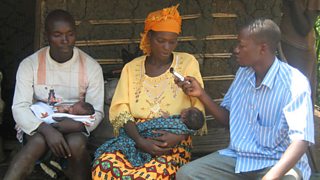In fear of stepping on Museveni’s tail
Richard Kavuma
Editor of Uganda’s The Observer newspaper
Tagged with:

A Ugandan journalist interviews a man and a woman
As part of a research series on support to media where rights and freedoms are constricted, Â鶹ԼÅÄ Media Action commissioned editor and journalist, Richard M Kavuma, to conduct a country study in his native Uganda. Here, he reflects on an increasingly fractured media landscape, where journalists and editors are vulnerable to intimidation and self-censorship.
Uganda's largest private newspaper, The Daily Monitor, has been celebrating 20 years since it started in a small warehouse in Kampala.
On 3 September, the leader article of Kampala’s Observer newspaper, where I am editor, congratulated The Daily Monitor on travelling “20 jagged years”. Our leader noted that the Daily Monitor has, over the years, trained many courageous journalists and endured harassment of its staff by the state and its agents.
On first sight, this talk of harassment of Ugandan media may come as a surprise. Compared to many African countries, Uganda’s media scene comes across as relatively free and vibrant and never afraid to speak the truth to power. The country has hundreds of privately-owned radio stations and dozens of TV stations, newspaper and magazines.
A cat called Naamu
But things are not always what they seem. Let me use an analogy from my childhood. My little sister and I had a lovely cat called Naamu. Whenever we were washing the floor, Naamu would grab the mop and play with it before pushing it back to us. We all loved the game.
But one time, I accidentally stepped on Naamu’s tail. Her reaction was frightening. She hissed angrily and tried to scratch me with her claws. From then on, we had to be careful playing with Naamu, in case we stepped on her tail and got scratched.
One reason The Daily Monitor’s years have been jagged is because the relationship between President Museveni’s government and the independent media very much resembles our relationship with Naamu. Unfortunately for us, the nature of our jobs as journalists makes it almost inevitable that we have to step on the government’s tail. And since state agents may not appreciate that fact, critical journalism’s body bears the marks of scars from the state’s scratches.
Media freedom
But it also means many journalists tend to tread very cautiously to not step on the tail of the government – especially when it involves the most important centres of power, like the Presidency and the military.
In a nutshell, our media freedom is largely exercised within a cage surrounded by tough thorns.
I got a clear sense of this cage late last year, when I returned to Uganda from London to conduct a study for Â鶹ԼÅÄ Media Action on media development support in Uganda. Almost every journalist, editor and consultant I interviewed said that the space for freedom of expression was getting more constrained.
As one senior journalist told me, if you avoid the very sensitive topics and individuals and you write about the weather, for instance, you can enjoy maximum press freedom. I also found that if you work for a national newspaper or one of the large, city-based radio or TV stations, you are less likely to be harassed by state agents than if you work for a radio station in the countryside.
Yet these rural radio stations are the ones that serve the majority of Ugandans. This means that a significant portion of Uganda’s population is denied access to critical information and debate about national governance.
The state doesn’t only use the courts or security agents to pressurise journalists and media houses. The state is one of Uganda’s largest advertisers and between 1993 and 1998, for example, the government banned its departments from advertising with The Daily Monitor.
A protective shield
One of the best articulated recommendations from my interviewees is that donors, who profess valuing independent media as a component of democratic governance, should find a way to support critical media houses committed to independent watchdog journalism.
This kind of support would work as a kind of protective shield so that journalists do not have to fear suffering the state’s scratches.
But that seems far off. In the meantime, as our recent lead comment on The Daily Monitor said, someone must be ready to walk that jagged road and step on those tails – even it means being scratched.
Related links
